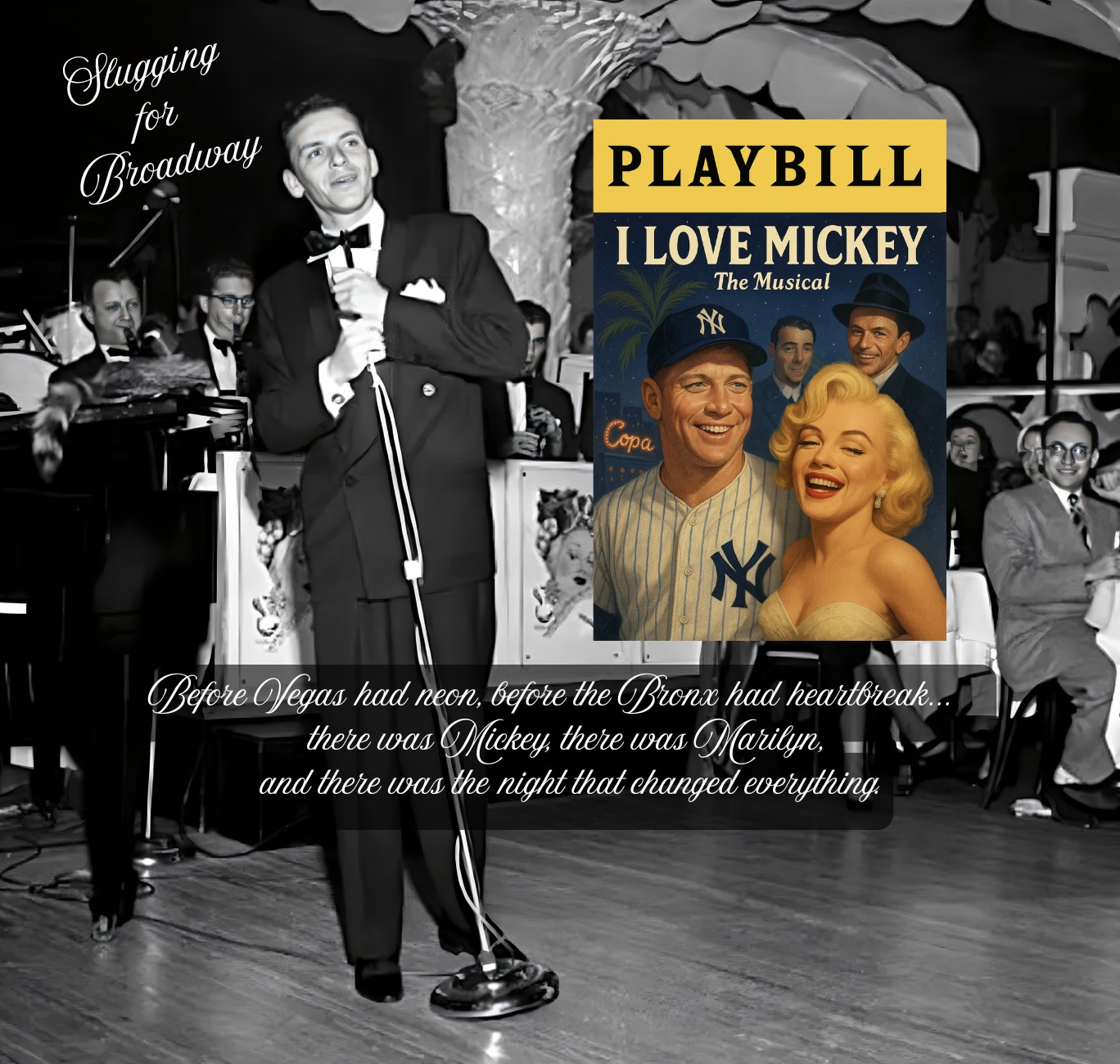
A stage design for I Love Mickey could take inspiration from the fluid, multi-level approach of Hamilton, but with a fast-moving setting visually evocative of 1950s New York nightlife. Picture a flexible, jazz-club-inspired set with

- A rotating central platform (like Hamilton) for seamless transitions.
- Multi-level scaffolding that doubles as a nightclub balcony, the Yankees’ dugout, or even a street corner.
- A neon-lit Copacabana sign that flickers during key moments.
- A bar setup that transforms into the New York Yankees anywhere else clubhouse—where the characters swap drinks and stories.
- Rolling set pieces that can quickly suggest different locations: a dimly lit back alley, the baseball field, or a high-energy Copa dance floor.
Overall Stage Concept
- The main set is a nightclub-inspired backdrop that shifts between the Copacabana, Yankee Stadium, and various city locales.
- Multi-level scaffolding creates depth, allowing characters to move dynamically.
- A rotating platform at center stage enables quick transitions between scenes.
- Neon signage (“Copacabana” in elegant script) flickers and changes color to match the mood.
Key Set Pieces & Scene Transitions
1. The Copacabana (Opening Scene)
- A grand entrance staircase leads down to the club floor.
- The bandstand is visible in the background, set slightly above the action.
- Cocktail tables and bar stools roll on and off for quick transitions.
- A light-up Copa sign flickers to life when the club is introduced.
Visual: Think Hamilton’s tavern scene meets Jersey Boys—red velvet, jazz club vibes, cigarette smoke in the air.
2. Yankee Stadium (Billy & Mickey on the Field)
- The nightclub transforms seamlessly—tables disappear, and rolling stadium lights drop in.
- The multi-level scaffolding becomes the dugout, with players watching from above.
- A scoreboard projection in the background tracks key moments.
- The rotating platform brings Mickey & Billy to the batter’s box in real time.
Visual: The Copacabana dissolves into pinstripes—stagecraft that feels cinematic.
3. The Infamous Copacabana Brawl
- The bar counter rolls forward, shifting to a tense, shadowy scene.
- Overhead balcony serves as a VIP area where gangsters and ballplayers watch the action.
- A choreographed fight sequence unfolds in slow motion under flashing lights.
- Tables overturn, a bottle smashes, and the neon flickers—chaos takes over.
Visual: Imagine Scorsese’s Goodfellas meets Broadway spectacle—slow-motion punches, jazz brass hits.
4. New York City Streets (Post-Brawl Aftermath)
- The rotating platform spins as Billy stumbles outside into the rain.
- Streetlights drop down from above to frame a lonely moment.
- Brick walls & fire escapes roll in, completing the look.
- Projected newspaper headlines reveal the media scandal breaking in real time.
Visual: Noir lighting, like a Broadway Raging Bull—gritty but theatrical.
5. The Yankee Clubhouse (Billy & Mickey’s Brotherhood)
- Scaffolding transforms again—lockers appear, a “No Smoking” sign dangles.
- The bar from Copa now doubles as a clubhouse bench where they drink and reflect.
- Spotlight isolates the two men as they talk about baseball, friendship, and trouble.
Visual: Intimate, raw, and poetic—like Fences with a baseball spin.
Final Thoughts
- The set should breathe like New York—a city that’s always moving.
- Live music & lighting shifts create the illusion of seamless scene changes.
- A rotating platform + rolling props make it a dream for fast-paced storytelling.

